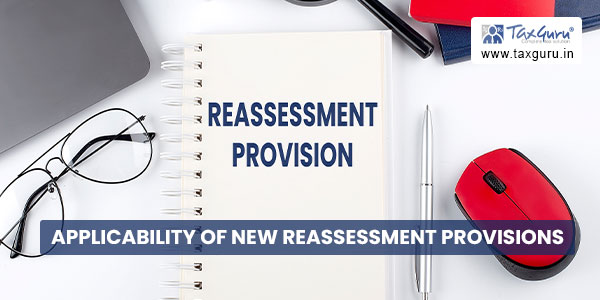Introduction of section 148A and relevant amendments in Section 147, Section 148 and Section 149 (herein together referred to as new reassessment provisions) was the major portion of Finance Act 2021. The applicability of these new reassessment provisions was from 1st April 2021. However, CBDT in exercise of the powers conferred by sub-section (1) of section 3 of the Taxation and Other Laws (Relaxation and Amendment of Certain Provisions) Act, 2020 came up with the notification regarding the deferment of the applicability of new reassessment provisions upto 30th June 2021.
Since 1st April 2021, there has been a disarray regarding applicability of new reassessment provisions the reason for which being – many assessee’s received reassessment notices that are not compliant with the procedure laid under section 148A, considering the notification issued by the CBDT.
The question that remains over here is whether – Section 3 of the Taxation and Other Laws (Relaxation and Amendment of Certain Provisions) Act, 2020, override the provisions of Income Tax Act 1961.
There has been divergence in the decisions of Various High Courts in regards to this matter. Decisiongiven by Delhi High Court and Allahabad High Court are in favor of assessee on the ground that new reassessment provisions made applicable w.e.f. 1-4-2021 by FA 2021, the notices issued on or after 1st April 2021 must comply with new reassessment provisions. Neither the Finance Act, 2021 nor section 3(1) of the Relaxation Act, 2020 delegate power to the Central Government to defer applicability of new reassessment provisions enacted by Finance Act, 2021. Therefore, Explanations in Notifications, which allowed Department to issue reassessment notices till 30th June 2021 under the old provisions which applied till 31st March 2021, deserve to be quashedas it is ultra vires to section 3(1) of the Relaxation Act 2020 and, reassessment notices issued under old provisions/’extended’ old time-limits, from 1st April 2021 to 30th June 2021, based on these Notifications also deserve to be quashed if time-barred as per new reassessment procedure.
Chhattisgarh High Court has rendered decision in favor of Revenue and contended that notice remain valid even if procedure under section 148A has not been followed as there were notification issued in exercise of the powers conferred by section 3(1) of the Relaxation Act 2020 and extended the last date to issue notice under section 148 under the old regime to 30th June 2021.
WhiIe the above judgements still remain contradictory, a SC ruling on this matter could prove to be a landmark judgement on the applicability of the new reassessment provisions as issued in the CBDT notification.
How new reassessment procedure is different from old one.
Under the old procedure of reassessment there was no specific procedure prescribed under the act so we use to refer the procedure given by Apex court in the decision of GNK Drive shaft which was as follows:
- Assessing Officer (AO) must record reason in writing which led to formation of belief
- AO must obtain the sanction of Higher Authority
- AO will issue notice to the assesse u/s 148 and direct assesse to furnish fresh ROI within a specified period,
- After Assessee furnishes the return, assessee gets right to ask the AO to furnish a copy of recorded reason
- Assessee has right to raise objections on the recorded reasons
- AO must dispose the objections through speaking order

It was held by Apex court in case of GNK Driveshaft that if AO does not observe the above procedure then assesse has a right to file writ petition with High Court under the article 226 and High Court can declare the proceedings as null; and void.
Under the new regime there is a separate insertion of procedural section i.e.under section 148A, which is mandatory to be followed by the authorities issuing notice post 31st March 2021. The procedure is as follows:
- AO may conduct any enquiry, if required, with the prior approval of specified authority
- AO has provide an opportunity of being heard to the assessee
- AO will then consider the reply of assessee furnished, if any, in response and decide, on the basis of material available on record including reply of the assessee, whether or not it is a fit case to issue a notice under section 148, by passing an order, with the prior approval of specified authority.




